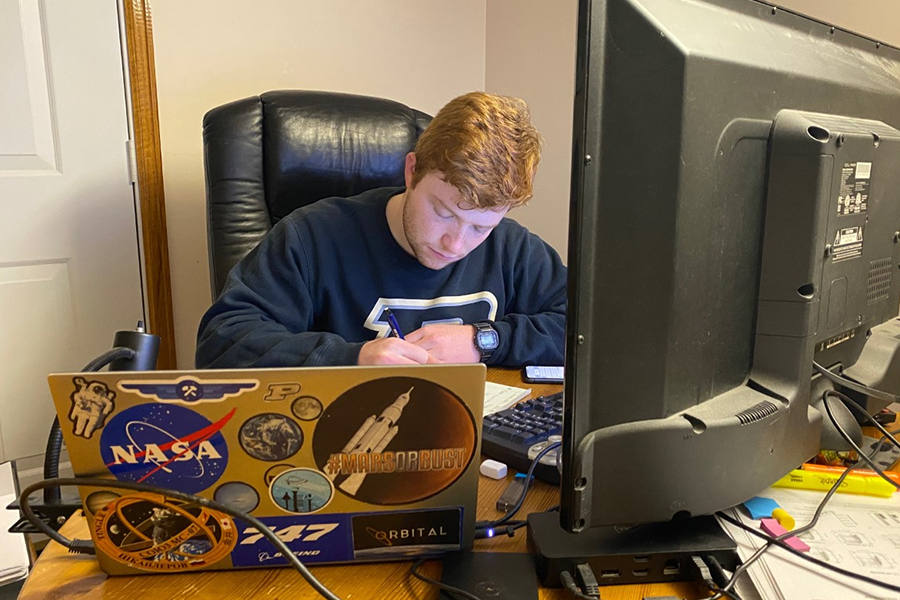Passion not paused: Student organization perseveres despite remote learning

We only see each other’s faces in fuzzy, 2-inch squares on a computer.
We are used to rubbing elbows for hours on end, tirelessly working toward our shared dream of reaching space.
We miss our team trivia nights at the Stacked Pickle, our intramural sports teams and our once-in-a-while dining court dinners after long and productive meetings.
The sound of ecstasy, a rocket ripping off the pad and zipping into the Indiana sky, is silent. For now.
Slowly, members of Purdue Orbital are adjusting to life of remote learning, devoid of hands-on experimentation, as universities across the nation have changed operations due to COVID-19. Having to transition from the most successful semester in our history to remote operations was sudden. Honestly, it’s been hard at times.
Like many other student organizations on Purdue’s campus, we like to think of ourselves as a community of students. Our group has a common passion for space exploration. A shared bond of accomplishing what some think impossible — and being driven, again and again, by it.
We remain just as driven to accomplish our goal, despite the uncertainty surrounding the coronavirus. We are finding new ways to move forward in these unprecedented circumstances.
As a 135-member strong, completely student-led design/build/test team on campus, Purdue Orbital relies heavily on interpersonal communication to stick to a timeline. Especially with the goal we’re working toward. We want to access space in a novel, innovative and unique way — by launching a rocket off a high-altitude balloon to orbit. To do that, we recruited a talented and multidisciplinary team of undergraduate students from across the University, not just the College of Engineering. Innovations in our aerospace design are complemented by a large volunteering/community outreach presence, active social media accounts, as well as almost $80,000 raised all on our own. For these reasons, Purdue Orbital often has been referred to as a “startup simulator.”
This past year was turning out to be our best year yet. We had a successful test launch in February that saw a rocket fly off our custom launch platform for the first time. We also were on track to test rocket propellants at Zucrow Labs by the end of the year. And then Purdue, like universities across the country, suspended in-person activities due to COVID-19. We were impacted heavily by that.
Orbital prides itself as a close-knit group of talented students. Our meetings typically are held in large auditoriums or design spaces where we can interact, communicate and make progress as teammates and good friends. In light of recent events, our leadership team immediately began to make the most out of the situation, establishing space on digital video platforms, like Cisco WebEx. The leadership team hosts weekly meetings using WebEx in order to keep the team on track, still making as much progress as possible by maintaining a scheduled approach to our designs. We also include the next leadership team in these meetings so they can acquire specific leadership skills for the upcoming school year. Individual sub-teams also meet in a similar fashion, communicating logistics information and fulfilling design requirements.
Our production timelines have been affected because many design facilities have closed both on-campus and across the country. Purdue Orbital conventionally uses laboratories and manufacturing facilities at Purdue University. We also have several students who are seeking certifications to fly high-powered amateur rockets but were unable to perform the launches required in order to acquire these certifications. These setbacks hurt our ability to make progress, but Boilermakers are adaptable, resilient and know how to react to situations quickly. Purdue Orbital is no exception.
Orbital has been using this time to prepare for the future by laying the groundwork for a more productive and successful 2020-21 academic year. During the quarantine, Orbital’s technical emphasis has been placed on refining our system requirements, concept of operations and reevaluating our flight project lifecycle, as well as ensuring a smooth transition from one leadership team to another.
On another optimistic note, much of Orbital’s fundraising is provided by external organizations and sponsorship grants. These groups, although negatively impacted by COVID-19, have agreed to extend funding to next semester in order to offset challenges faced by the organization. Orbital is glad to work with understanding organizations like the Indiana Space Grant Consortium, the Purdue Engineering Student Council and the School of Aeronautics and Astronautics. We also are reaching out to our extensive alumni/sponsor network and providing an update on organizational activities, allowing us to maintain contact throughout these tough times.
Orbital’s members have been extremely receptive to the changes, accomplishing many administrative tasks in preparation for the fall semester. We are optimistic about the organization because our membership body was able to rally around a new means of conducting business. Our personal and professional outreach remains strong as we continue to network both internally and with interested organizations. Orbital hopes to carry this momentum through to the upcoming fall, when Purdue hopefully reopens. Until then, we will continue to push forward.
As a graduating senior, it gives me hope that this group of outstanding undergraduates found a way to take significant steps toward our goal, regardless of the circumstances surrounding us. We move forward with optimism and perseverance as we welcome today’s challenges in anticipation of an exciting future.
Jonathan Webb, president of Purdue Orbital, senior, School of Aeronautics and Astronautics
For more information about Purdue Orbital, email Purdue Orbital
The views and opinions expressed in this blog are those of the authors and do not necessarily reflect the official policy or position of Purdue University or the School of Aeronautics and Astronautics.
